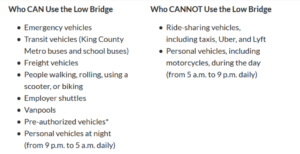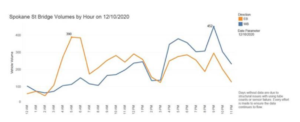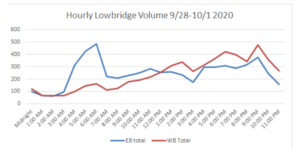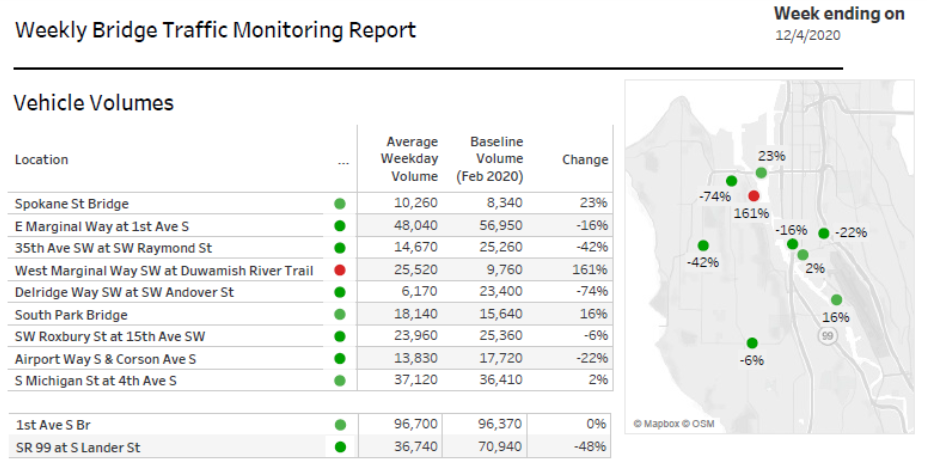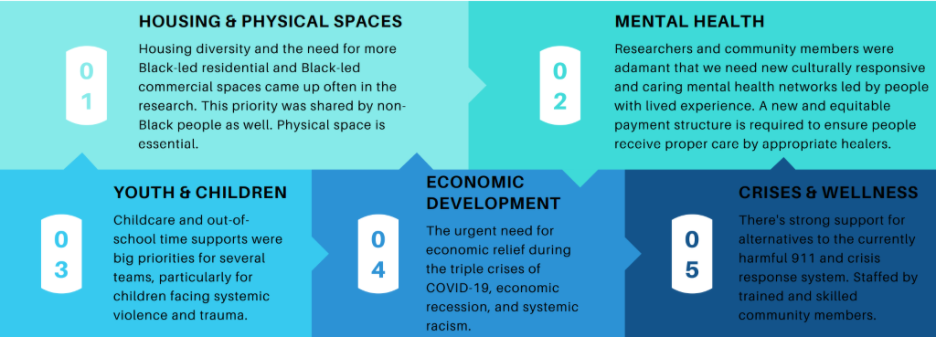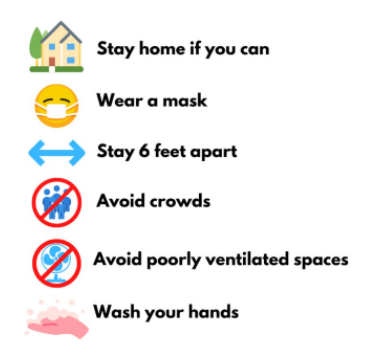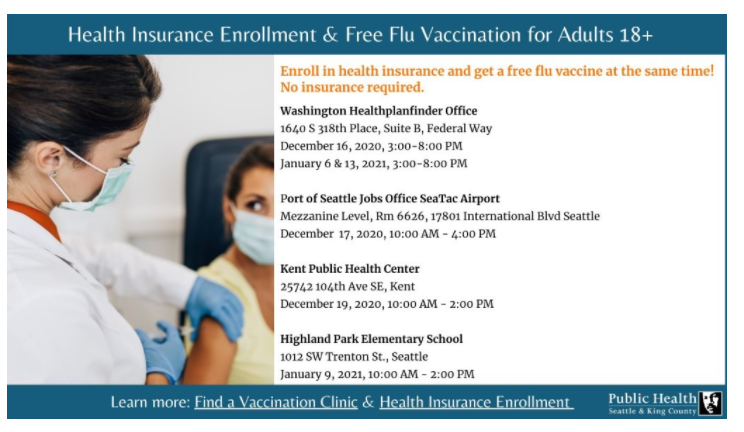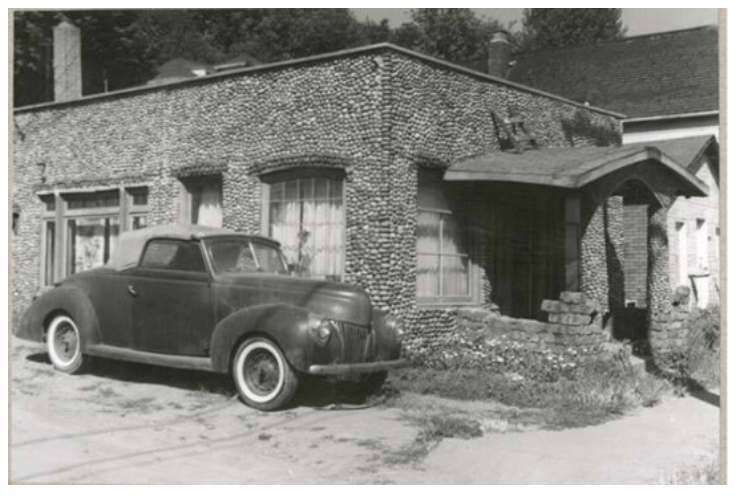West Seattle Bridge Update December 18;
West Seattle Bridge Update December 18
In January SDOT will begin automated photo enforcement on the (Spokane Street) lower bridge. With the start of camera enforcement, SDOT will conduct an ongoing evaluation of capacity on the bridge, and consider adjusting access on a monthly basis. SDOT has convened a lower bridge subcommittee to advise SDOT regarding bridge uses, and SDOT reports that they are “working with the health care community to define authorized essential workers and total trips that could be allowed (emphasis added).”
Personal vehicles are allowed to use the bridge between 9 p.m. and 5 a.m. daily.
Here’s a summary of allowed bridge use:
I asked SDOT recently about use of the bridge between 5 a.m. and 6 a.m., something constituents have contacted me about. They indicated the bridge is at capacity for the corridor from 5-6 a.m. Here’s the traffic volumes from December 10:
SDOT notes the trend is consistent over time; below are traffic volumes from September 28 through October 1.
Here’s information about King County Metro’s vanpool program for West Seattle commuters to access the lower bridge, and eligibility for a promotion to start a new Vanpool or Vanshare and receive up to the first two months free. You can send any questions to vanpool@kingcounty.gov.
SDOT is planning to finish West Seattle Bridge stabilization work this month. On Pier 18, they finished pouring the concrete that will keep the lateral bearings in place, and are completing the final round of carbon fiber wrapping.
Here is the most recent traffic volume data:
Here are the most recent vehicle travel times:
Council Adopts 2021 Budget
In late November, the City Council adopted 2021 City budget that focuses on the key areas of economic recovery, health and safety, and housing.
The budget process began in late September, when the Mayor proposed a budget. The Council dedicated two months to analyzing and making changes to the proposal.
The City’s total budget is $6.5 billion, of which $2.76 billion can only be allocated to City Light and Seattle Public Utilities because that revenue comes entirely from ratepayers. The City’s General Fund totals $1.4 billion.
The adopted budget includes approval to issue $97.2 million in bonds to the overall West Seattle Bridge project, which includes Reconnect West Seattle projects to mitigate traffic impacts, as well as work to maintain the Spokane Street (lower) bridge. This adds $27.2 million to the $70 million interfund loan that I co-sponsored and that was earlier approved by the Council.
Below are items I sponsored, or co-sponsored as noted.
District 1 Transportation
West Seattle Bridge/Reconnect West Seattle: Require reporting for the West Seattle Bridge/Reconnect West Seattle program, SDOT’s mitigation program to fund project that ameliorate impacts of West Seattle detours routes on communities like Highland Park and South Park.
West Marginal Way Longhouse crossing project; this specifies that $2.8 million will be included in the 2021 budget for this project with full funding.
Georgetown to South Park Trail I co-sponsored this proposal with lead sponsor Councilmember Morales, which provides $5.2 million toward the trail.
Community Safety
Provide funding to a. reverse cut of Fire exams and b. reverse cut of 20 firefighters from SFD recruit class: Maintains current hiring and testing capacity. The SFD has recently seen an increase in firefighter separations, and If the same attrition pattern on average over the last five years (38 separations) continues in 2021, SFD could have 75 vacancies with an additional 412 eligible for retirement.
Add funding to expand Health One: added $254,000 to the Fire Department and $222,975 for personnel to the Human Services Department to expand Health One operations. Health One is an innovative model that reduces reliance on SPD and SFD resources by better connecting people who call 911 with appropriate and necessary services– whether they need medical care, mental health care, shelter, or other social services.
Add funding to the Fire Department to fund Automated External Defibrillators (AEDs), Lucas Devices, and Ballistic Sets: AEDs provide an electrical shock in cases of life-threatening cardiac arrhythmias which lead to sudden cardiac arrest. Lucas Devices provide chest compressions (CPR) when it is unsafe for Emergency Medical System crews to do so. Ballistic Sets protect firefighters and paramedics at scenes of violence and allow them to quickly enter these scenes to rescue highly vulnerable patients.
The role of parking enforcement officers: Expand the function of the proposed Seattle Emergency Communications Center to include Parking Enforcement Officers (PEOs) and rename the office the Seattle Community Safety and Communications Center (CSCC). Consider expanding the current role of the PEOs to assume functions currently provided by SPD sworn officers, which could include red light camera enforcement, school zone enforcement, response to non-injury collisions, response to and reporting on minor thefts and car break-ins, and traffic control.
South Park Public Safety Coordinator: This will continue the work of the South Park Public Safety Coordinator. This position was the top priority recommendation in the 2017 South Park Public Safety Taskforce Report funded by the City Council. Current priorities include facilitating community safety dialogue around South Park’s experience around policing and alternatives to police in South Park; street and safety concerns due to West Seattle Bridge closure, business district concerns, and youth engagement. Recent work includes coordinating Crime Prevention Through Environmental Design (CPTED) work in youth art murals and a Clean Streets Initiative, community support during COVID, neighborhood walks, and facilitating and distributing a neighborhood newsletter in English, Spanish and Vietnamese. Here is a great article about his work.
Community-Led Public Safety Investments: Appropriate funds for scaling up community-led organizations, to move the City’s community safety strategy toward a public health-centered, harm reduction model of restorative justice, crime prevention, and ameliorating the harm caused by the criminal legal system to individuals and communities most impacted. These strategies will aim to prevent, reduce and mitigate both violent and non-violent crime.
Restore Funds for Alternatives to Criminal Legal System: Restore funds proposed for reduction to organizations pursuing alternatives to or addressing harms caused by the criminal legal system that were awarded grant funding through the 2020 Collaborative Grantmaking process.
SPD Budget: These actions reintroduced reductions to the SPD budget adopted in the 2020 summer budget rebalancing, including proposals for out of order layoff reductions in sworn officers and reduction of overtime and travel. Also included was abrogation of vacant positions, and positions not possible to be filled under SPD’s staffing plan, to align funding for positions with staffing, and free up funds not anticipated to be spent. Those dollars will be invested into community-led public safety investments.
SPD Overtime and staffing tracking: These actions request SPD to report to the Council monthly on use of overtime, and staffing levels.
Report on traffic stops: This requests SPD report on the demographics of traffic stops for criminal and non-criminal purposes, and racial disparities, as requested in Ordinance 125358 on bias-free policing; and a report with recommendations on training and policy changes consistent with the Department of Justice Consent Decree to address bias and disparities in the report
Participatory Budgeting: Council approved significant funding for community safety grants allocated through a participatory budgeting process in the 2021 budget. Seattle is behind other major cities when it comes to allocating larger dollar amounts and supporting participatory budgeting, although we have experience with participatory budgeting through Your Voice, Your Choice. Paris allocates about $60 million annually through participatory budgeting. Learn more about cities all over the US and Canada doing participatory budgeting at the Participatory Budgeting Project: https://www.participatorybudgeting.org/case-studies/
These community safety grants will be informed by the community-based participatory research currently underway by Black Brilliance Project, through a contract with the Legislative Department. Black Brilliance Project researchers gave Council an update on their research this Monday; you can watch the presentation here. These researchers aren’t just collecting data; they include young people, elders, and people with lived experience of community safety and our criminal legal system, as well as upstream systems. The researchers are also diving into the nuance in stories and asking deeper questions about systemic violence and how it effects us collectively as well as individually. While the research is still underway, here are some early, high-level recommendations:
Housing and Human Services
Provide Funding for Landlord Liaison Program: fully fund a landlord liaison program that has connected 1,170 individuals to housing by establishing partnerships of landlords that own more than 470 properties.
Add Funds to Maintain Family Rapid Rehousing Caseloads: Due to the economic impacts of the COVID-19 pandemic, homelessness services agencies report that households enrolled in rapid re-housing programs have required substantially longer to exit the program. This increases funding to ensure families do not fall back into homelessness, with half of the funds reserved for agencies with culturally-relevant expertise or serving populations disproportionately affected by homelessness.
Age Friendly Seattle: Restore proposed cuts to Age Friendly Seattle.
Reduce Overdoses and Overdose Deaths: Add funding to contract with Public Health for services recommended by the 2016 Heroin and Prescription Opiate Addiction Task Force for active drug users in existing low barrier programs with the goal to reduce overdoes and fatal overdoses as well as increase the health of people who use substances.
Increase Services for Drug Users: Increase services and harm reduction programs at social service agencies that serve people who use drugs daily, allowing them to expand hours, increase staff, expand to additional locations, provide peer and community outreach, implement good neighbor agreements for syringe pickup, provide participant incentives, explore Medicaid reimbursement for services, and make safety improvements.
Increase Outreach to People Experiencing Homelessness: Expand homelessness outreach and engagement services within District 1 and citywide, and provide flexible financial assistance for serving people experiencing unsheltered homelessness.
Social Service Provider Academy; this is a career development program that offers higher education opportunities to housing and homelessness social services entry level staff who are interested in advancing professionally in their field.
One element of the balancing package, proposed by Budget Chair Mosqueda, increased the amount in the Emergency Fund by $32 million, to $38 million. Given the course of COVID-19 and economic uncertainty heading in to 2021, this is a good precaution.
With the COVID pandemic ongoing, impacts to businesses and workers continue. Earlier this week the Council adopted $5 million in relief fund for small business grants focusing on hard-hit restaurants and bars, and workers in the hospitality industry.
Free Testing for COVID-19 in District 1
District 1 long term care facilities are again struggling with coronavirus, with both Providence Mount St. Vincent and Park West reporting significant outbreaks and deaths among residents and staff in the past several weeks. There have been over 500 deaths at long-term care facilities in King County, representing 60% of all Covid-related deaths since the pandemic began. My heart goes out everyone who is concerned about their vulnerable loved ones right now.
Early testing is important to help prevent COVID-19 from spreading to friends, family, and the community. If you have a sign/symptom of COVID-19 or were exposed to someone with COVID-19, please get tested.
- Get tested for COVID-19 if you have any of the above symptoms, or: fatigue, headache, sore throat, congestion or runny nose, or nausea.
- If you have difficulty registering, call the King County COVID-19 Call Center at 206-477-3977 (open 7 days a week, 8 a.m.-7p.m.) If you need an interpreter, please tell us in English what language you need.
City testing sites can handle more than 7,000 tests daily. 1 in 4 Seattle residents have reportedly used these sites so far. The City has administered 450,000 tests across the Aurora, SoDo, Rainier Beach, and West Seattle Citywide testing locations since June.
West Seattle Walk-up, 2801 SW Thistle St., Seattle, WA 98126
Make reservations online
Available, Mon-Sat, 8:45am-5:30pm
Languages: Interpretation available including ASL and tactile interpretation
NOTICE: Will be closed on Dec. 24, Dec. 25, Dec. 31 and Jan. 1.
Additional testing sites in District 1 – call for appointments and more information:
Neighborcare Health at High Point
6020 35th Ave SE, Seattle, WA 98126
Available: Monday-Friday, 1:00 pm – 4:00 pm
Languages: Amharic, Amharic, Arabic, Cambodian, Oromo, Russian, Somali, Spanish, Ukrainian available onsite; interpretation available
Call for appointment: (206) 461-6950
Sea Mar Community Health Centers at South Park
8720 14th Ave S, Seattle, WA 98108
Languages: Spanish, Interpretation available
Call for appointment: (206) 762-3730
As a reminder, the best ways to keep our community safe and healthy are:
Free Flu Vaccination and Help with Health Insurance
For more Health Insurance Open Enrollment events: http://kingcounty.gov/outreach
To find a vaccination clinic: http://kingcounty.gov/findaclinic
Eviction Moratorium Extension
On Wednesday, December 16 the Mayor signed a new Executive Order extending COVID-19 relief measures including an extension of the eviction moratorium through March 31, 2021.
Further, on Monday the Council unanimously passed an extension of temporarily suspended late fees on utility accounts; and the Utility Discount Program’s Self-Certification Pilot Program is extended until June 30, 2021, which can lower Seattle City Light bills by 60 percent and Seattle Public Utility bills by 50 percent.
Save the Stone Cottage
As you may have seen in their recent press release, Save the Stone Cottage is working to fundraise to save the building and move it before it’s demolished. The home needs to be lifted off the foundation and transported to a temporary location as a developer is moving forward with new construction at the property.
I’m so thankful for the efforts of so many neighbors that have come together to save Eva’s Stone Cottage, and none of it would be possible without the historic preservation efforts of all of those involved including: John Bennett, Kathy Blackwell, Deb Barker, Jeff McCord, Mike Shaughnessy, Ken Workman, BJ Bullert, Shari Sewell, and Lisa McNelis.
I’ve been encouraged by conversations early this year with the Parks Department and help from the Department of Construction and Inspections. Unfortunately attentions were turned to more pressing needs at the beginning of the public health emergency. I am hopeful we can return to those conversations in the New Year.
Shop Your Block
It’s a great time to support our beloved, local small businesses in West Seattle and South Park – from the safety of your home. If you still have holiday or year-end shopping to do, check out these online marketplaces.
Find online marketplaces for additional neighborhoods and a searchable interactive map of businesses here.
Council Recess
The Council will be on its regular holiday recess through January 4th, so there will be no City Council or committee meetings until then.
Happy Holidays to everyone!
Posted: January 4th, 2021 under Councilmember Herbold, COVID-19, Education, Homelessness, Parks and Recreation, Police Department, Public Health, Seattle Fire Department, Transportation
Tags: West Seattle, West Seattle Bridge

